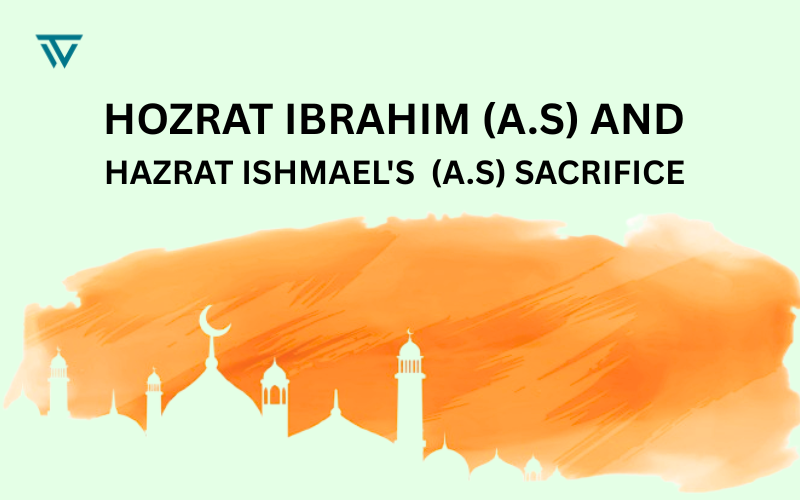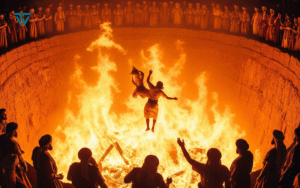The story of Ibrahim and Ishmael’s sacrifice

0 people are currently reading this article
The story of Ibrahim and Ishmael’s sacrifice is a profound example of faith and obedience. The life of Prophet Ibrahim, a true friend of God (Khaleelullah), was a model of deep love, unwavering faith, and unmatched sacrifice. He faced numerous difficult trials, each one a testament to the strength of his faith. However, one test stands above all others. It remains a shining example of submission to God for all humanity until the end of time—when he was commanded to sacrifice his beloved son, Ishmael.
The command came when Ibrahim was an old man, and Ishmael was the light of his eyes. This opened the door to an unimaginable test.
The Dream and the Beginning of the Trial
In the tradition of prophets, dreams were a form of divine revelation (Wahi). One night, Prophet Ibrahim dreamed he was sacrificing his son, Ishmael. This dream recurred. It convinced him it was not an ordinary dream but a clear command from God Himself. At the time, Ishmael was a young teenager, old enough to help his father with daily tasks. The Holy Quran describes this moving moment:
فَلَمَّا بَلَغَ مَعَهُ السَّعْيَ قَالَ يَا بُنَيَّ إِنِّي أَرَى فِي الْمَنَامِ أَنِّي أَذْبَحُكَ فَانظُرْ مَاذَا تَرَى قَالَ يَا أَبَتِ افْعَلْ مَا تُؤْمَرُ سَتَجِدُنِي إِن شَآءَ اللهُ مِنَ الصَّابِرِينَ
“Then, when (the son) reached the age of (serious) work with him, he said: ‘O my son! I see in a vision that I am offering you in sacrifice: Now see what is your view!’ (The son) said: ‘O my father! Do as you are commanded: you will find me, if Allah so wills, one practicing patience and constancy!'”
(Surah As-Saffat 37:102).
This brief exchange reveals the father and son’s extraordinary faith and unquestioning obedience. Ibrahim didn’t simply issue an order. He gently sought his son’s opinion. This showed both his love and his desire to gauge his son’s readiness. Ishmael’s reply was even more remarkable. He not only agreed but encouraged his father to carry out God’s command. He also expressed his firm belief that God would grant him the strength to be patient. His response shows he was not just an obedient son. He was a young man deeply educated in submitting to God’s will.
Satan’s Obstruction on the Path of Obedience
As Ibrahim took his son toward the plains of Mina near Mecca, Satan worked to stop them. It is narrated that Satan appeared in three different places, trying to tempt and mislead Ibrahim. He suggested it might be a meaningless dream or appealed to a father’s love for his son.
However, Ibrahim , firm in his trust in God, rejected Satan’s whispers every time. At each spot, he threw seven pebbles at Satan. This act is still a key ritual of the Hajj pilgrimage. It is known as the ‘Rami al-Jamarat’ or the stoning of the devil. It is more than a ceremony; it is a symbolic pledge. This pledge is for every believer to reject satanic temptations and remain steadfast in obeying God’s commands.
The Ultimate Surrender and Divine Help
When father and son reached the appointed place, Ibrahim once again told Ishmael about the dream and God’s command. Ishmael fully and willingly submitted himself to God’s will. Some accounts mention that Ishmael asked his father to tie his hands and feet and to lay him face down. This was so his struggle would not cause his father’s heart to weaken. It also ensured his blood would not stain his father’s clothes.
The Quran describes this moment of ultimate submission:
فَلَمَّا أَسْلَمَا وَ تَلَّهُ لِلْجَبِينِ، وَنَادَيْنَاهُ أَن يَّآ إِبْرَاهِيْمُ، قَدْ صَدَّقْتَ الرُّؤْيَا إِنَّا كَذَالِكَ نَجْزِي الْمُحْسِنِيْنَ، إِنَّ هَذَا لَهُوَ الْبَلآءُ الْمُبِيْنُ، وَفَدَيْنَاهُ بِذِبْحٍ عَظِيْمٍ، وَتَرَكْنَا عَلَيْهِ فِي الْآخِرِيْنَ، سَلاَمٌ عَلَى إِبْرَاهِيْمَ
“So when they had both submitted their wills (to Allah), and he had laid him prostrate on his forehead (for sacrifice), We called out to him, ‘O Ibrahim ! You have already fulfilled the vision!’ Thus indeed do We reward those who do right. For this was obviously a trial. And We ransomed him with a momentous sacrifice: And We left (this blessing) for him among generations (to come) in later times: ‘Peace and salutation to Abraham!'”
(Surah As-Saffat 37:103-109)
Just as Ibrahim prepared to draw the sharp knife, a voice came from the heavens. God announced that Ibrahim had fulfilled the vision. His sincerity and readiness were accepted. This was indeed a great test, and he had passed it successfully. By divine command, the Angel Gabriel brought a ram from paradise to be sacrificed in Ishmael’s place. This “momentous sacrifice” (dhibhin ‘aẓīm) was not just the replacement of a boy with an animal. It was an eternal recognition of unquestioning obedience to God.
The Deeper Meaning and Lessons
This historic event offers countless lessons for humanity:
- The Supremacy of God’s Love: The trial’s main purpose was to see if God’s love held the highest place in Ibrahim’s heart. It tested whether any worldly love, even for his own son, could stand in the way of God’s command. He proved that nothing is more important than pleasing God. The primary lesson is that a believer must prioritize love for God above all else. They must be ready to sacrifice their most cherished possessions for His sake.
- The Reality of Prophetic Dreams: This event confirms that the dreams of prophets are not mere imagination. They are a form of divine revelation. They are fundamentally different from the dreams of ordinary people. That is why Ibrahim did not hesitate to accept his dream as a command from God.
- Unified Generational Obedience: The harmony in obedience between the father and son shows an ideal family bond. The wisdom of the elder and the willing submission of the younger are key. This is how God’s laws can be established in society.
- Hagar’s Unseen Strength: Although Hagar was not physically present at the scene of the sacrifice, her earlier sacrifice and faith played a crucial role. Her trust in God was powerful. She was left in a barren valley with her infant son. Her faith, and the miraculous spring of the Zamzam well, were the backdrop to Ishmael’s upbringing. This shaped him into the patient and obedient son he became.
The Title of World Leader and a Lasting Legacy
Prophet Ibrahim passed many difficult tests from God throughout his life. In recognition of his steadfastness and success, God appointed him as a leader (Imam) for all humanity. The Quran states:
وَإِذِ ابْتَلَى إِبْرَاهِيْمَ رَبُّهُ بِكَلِمَاتٍ فَأَتَمَّهُنَّ قَالَ إِنِّيْ جَاعِلُكَ لِلنَّاسِ إِمَاماً،
“And remember that Ibrahim was tried by his Lord with certain commands, which he fulfilled. He (Allah) said: ‘I will make you an Imam to the Nations.'”
(Surah Al-Baqarah 2:124).
The great test of sacrificing his son was undoubtedly one of those commands. It earned him this status of world leadership. To keep the memory of his unparalleled sacrifice alive, God made animal sacrifice (Qurbani) an important act of worship for the Muslim community. Every year during the month of Dhul Hijjah, Muslims celebrate Eid al-Adha. This happens during the Hajj pilgrimage and around the world. They perform animal sacrifices to honor the great example of Ibrahim and Ishmael. They learn from their story and apply its lessons to their own lives.
Conclusion: Building a Life on the Ideal of Sacrifice
The story of Ibrahim and Ishmael’s sacrifice is not just a historical tale. It is a living, timeless example of immense faith, absolute obedience, supreme sacrifice, and deep love for God. This event teaches that there is no room for doubt or argument when it comes to obeying God’s command. True success lies in complete submission to His will. A believer can only achieve God’s pleasure and closeness by being inspired by this ideal of sacrifice. The global Muslim community embraces this memory. Through it, they renew their oath of self-purification and obedience to God. This happens every year through the act of sacrifice.
To err is human. If this writing contains any mistakes, I humbly seek your gracious understanding and forgiveness. If you have any suggestions, you can contact. Or if you want to post your article. Write the article on Google Docs and share it with your name and email.
MD. Sujon Ahmed




